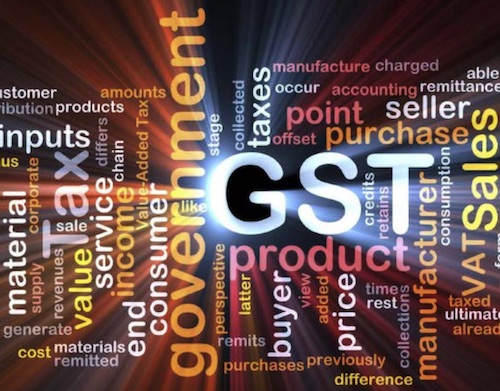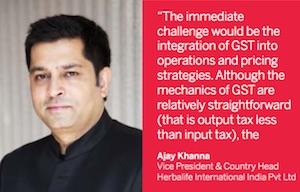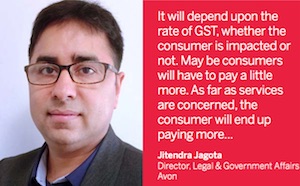GST, a Welcome Step, but Industry Needs Clarity

IN FOCUS
The proposed Goods & services tax is being viewed with perplexity by the industry in the absence of clear guidelines.
The GST (Goods and Services Tax) logjam continues with the Congress Party making it categorically clear that it will not budge on its stand unless the government submits a written reply to their key demands.
The ball, by all measures is back in the government court even as it continues parleys with other Opposition parties to tide over the stalemate and ensure the passage of the bill in the Budget session of Parliament.
While GST has become a bone of contention for the opposing parties, the Industry remains part enthusiastic and part apprehensive about the impending taxation regime.
Mr A Sen Gupta, CEO, Glaze Trading India Pvt Ltd, feels GST introduction is definitely a welcome step. However, articulating the concerns of the Direct Selling Industry he adds, “The concerns really relate to the relative expectations that were formed and focused this landmark transition and the extent to which simplification can be attained out of the new proposal. The very fact that there would be three different tax accounts under GST, instead of one, different set of norms under each head (CGST, SGST & IGST) will in fact create issues for smaller business entities, including the distributors and outsourced pick up centre owners.”
According to the supporters of GST, the proposed changes will simplify the complex indirect tax structure in the country and pave the way for India to rise up the ranks in the ease of doing business reckonings. Touted as one of the most major taxation reforms in the country, GST will create a single unified market by subsuming all other indirect taxes into a single tax including, octroi, central sales tax, excise duty, value added tax (VAT), state level sales tax, service tax. By doing away with the multiple tax levies, the government envisions creating efficiencies in tax administration by removing existing limitations. If such is the case, then why the concerns around this simplification exercise?
 The primary reason for concerns appears to be the lack of clarity on the proposed bill. Apprehensions abound as GST is being viewed as the game changer for some sectors, but some other sectors, it is being said, may not fare so well under the GST regime. Despite these concerns, by and large, the business community is looking forward to the simplified taxation administration as it promises to eliminate the multiple state barriers created by a plethora of taxes. With the Centre and the states working together, it is hoped that GST promises a panacea for the economy that businesses and investors can look forward to.
The primary reason for concerns appears to be the lack of clarity on the proposed bill. Apprehensions abound as GST is being viewed as the game changer for some sectors, but some other sectors, it is being said, may not fare so well under the GST regime. Despite these concerns, by and large, the business community is looking forward to the simplified taxation administration as it promises to eliminate the multiple state barriers created by a plethora of taxes. With the Centre and the states working together, it is hoped that GST promises a panacea for the economy that businesses and investors can look forward to.
The key concern for the Direct Selling Industry, according to Mr Ajay Khanna, Vice President and Country Head, Herbalife International India Pvt Ltd, centres on issues of flexibility in the GST regime. He says, “Indirect tax laws have not been able to recognize and accommodate the evolving business models. GST should have the flexibility to adopt the same.” His other concern stems from the fact that in the proposed GST, the fate of area-based exemptions is unknown. He also foresees negative working capital impact and is concerned that there may be an increase in cost of procurement of services from 12% to possibly more than 22% (proposed GST rate).
Pointing to another crucial concern, Mr Jitendra Jagota, Director, Legal and Government Affairs, Avon says, “The main concern, which I find after reading various reports, is regarding valuation of GST on MRP basis. Although, I read in the media that under the revised rules, it may be removed. As of now, we can’t comment with 100 per cent certainty on this, till the revised version of the draft Model GST Bill is in the public domain.”
The reference to impose GST on maximum retail price (MRP) in the earlier draft has been a major concern of retailers. The GST was proposed to be imposed on MRP on supply to consumers for goods governed by the Legal Metrology (LM) Act. A number of packaged goods come under the LM Act and retailers are concerned that GST would be levied on MRP even in cases where the consumers are paying discounted prices during sales. This would makes sales less attractive as the tax outgo would be higher.
>Mr Jagota states that valuation based on discounted price will be good for the trade as well as retail consumers of the packaged commodities.
Mr A. Sen Gupta, CEO, Glaze Trading, feels the impact of GST, vis-a-vis the current scenario, would be of slight advantage with present practices. However, “to harness the added benefits of GST, the Industry needs to reshape its business strategy, mainly supply chain management. Certain preparatory steps are definitely required,” he adds.
Mr Khanna too feels the need for the Direct Selling Industry to prep up for transition to GST. For the Direct Selling Industry, the immediate challenge for the Industry would be integration of GST into their operations and pricing strategies. “Although the mechanics of GST are relatively straightforward (that is output tax less than input tax), the challenge is in the capability of the IT systems to cope with the demands of GST, the need to educate suppliers and customers,” points out Mr Khanna. Listing his concerns for the Industry, Mr Khanna adds, “Pricing strategies will have to be accurately modeled as a wrong decision could impact the company’s performance.” Companies will also have to work on cash flow management.
Mr Khanna predicts that GST would lead to an increased fungibility of credit on goods and services. Further, full credit of tax on interstate sale will reduce cost of procurement/production. Additionally, no retention/disallowance on stock transfer of goods will also reduce cost procurement. With GST, credit of import duties will make imports cheaper and thus, all imported consumer goods will benefit.
Another aspect that makes GST attractive for businesses is, as Mr Jagota says, it would make it easier for businesses to travel where they want and would cut down the need for warehouses in different states. “GST will ease the operations of Direct Sellers and goods will move out from mother warehouse to various locations,” he adds. However, all this is not yet clear.
Mr Khanna seconds this adding, “Today, entry tax is a cost in most cases, along with additional compliance burden. With GST, entry tax and its ills will be eliminated.”
According to Crisil, GST would help reduce logistics costs by as much as 20 percent for companies producing non bulk goods. The savings will result from the gradual removal of central sales tax (CST), faster transit of goods under the simplified tax structure and consolidation of warehouse space, according to the ratings agency.
 State wise turnover should be considered for determining threshold limit
for registration under GST, suggests Mr Khanna, adding, “Transfer of credits from one state to another must be allowed.” In the proposed GST, according to media reports, those traders who have a turnover of less than Rs 10 lakh annually, will be exempted from registering for or paying the GST. For traders with annual sales between Rs 10 lakh and Rs 50 lakh, tax at
a rate lower than the standard GST rate
is being considered. However, traders involved in inter-state transactions, irrespective of turnover, will not be allowed the concessional tax rate. The GST Council which will determine the standard GST rate will also decide the quantum of concession. Mr Sen Gupta is in favour of keeping Direct Sellers out of the GST bracket till a limited sales turnover on their side, so long as they do not claim any set off. Explaining his point he adds, “The initial threshold limit of exemption allowed to Direct Sellers will, to a large extent, determine the benefit to consumers as the retail margin is substantial under Direct Sellers. Since every Direct Seller operates with small turnover, any tax liability on their sales margin could reduce the consumer benefits.”
State wise turnover should be considered for determining threshold limit
for registration under GST, suggests Mr Khanna, adding, “Transfer of credits from one state to another must be allowed.” In the proposed GST, according to media reports, those traders who have a turnover of less than Rs 10 lakh annually, will be exempted from registering for or paying the GST. For traders with annual sales between Rs 10 lakh and Rs 50 lakh, tax at
a rate lower than the standard GST rate
is being considered. However, traders involved in inter-state transactions, irrespective of turnover, will not be allowed the concessional tax rate. The GST Council which will determine the standard GST rate will also decide the quantum of concession. Mr Sen Gupta is in favour of keeping Direct Sellers out of the GST bracket till a limited sales turnover on their side, so long as they do not claim any set off. Explaining his point he adds, “The initial threshold limit of exemption allowed to Direct Sellers will, to a large extent, determine the benefit to consumers as the retail margin is substantial under Direct Sellers. Since every Direct Seller operates with small turnover, any tax liability on their sales margin could reduce the consumer benefits.”
Mr Khanna emphasizes the need for uniformity and ease in the various rules.
Place of Supply Rules with respect to common services needs to be hassle free, and Valuation Rules need to outlined clearly so that transactions such as FOC, stock transfer, material sent for job work, etc., can be valued to arrive at the appropriate tax to be levied, he explains. As regards Transition Rules, transition of input credits into GST without the requirement of linking the same with the inventory lying on the date of implementation, must be ensured.
Talking about the impact of GST on consumers, Mr Jagota says it will all depend upon the rate of GST. “Consumers may have to pay little more. As far as services are concerned, the consumer will end up paying more due to unified rate of tax for products and services.”
Mr Sen Gupta too points out that the adverse impact of GST on consumers devolves around a higher tax percentage/regimen under the proposed GST.
“Unless the set-off benefits of service and other indirect taxes are passed on by the seller, the consumer may not benefit,” he explains. Uniform taxation will bring about uniform pricing and this will benefit consumers, say Industry experts.
 Mr Jagota does not expect any drastic changes post GST in the Direct Selling Industry, however the Companies will be required to devise some strategy for pricing their products right. Direct Selling is another format of selling the products in retail and hence GST will impact the Industry to a large extent as it impacts FMCG sector. Currently, every state has its own threshold limit for turnover beyond which a Direct Seller has to obtain VAT registration. However under GST, there will be a unified threshold limit. The limit will determine how it will impact the Direct Sellers. Businesses require VAT registration from state sales tax department to operate. Since currently states follow different procedures and fees, businesses operating from multiple states have a difficult time ensuring compliance. It is expected that GST registration bring about a centralised and standardized procedure enabling ease of doing business in the country. Mr Khanna feels that since GST is being billed as a unified law bringing various legislations under its ambit, “There should not exist any differentiation between what qualifies as ‘services’ and what qualifies as ‘’goods”. Such difference should be done away with to bring in uniformity and avoid any litigation.”
Mr Jagota does not expect any drastic changes post GST in the Direct Selling Industry, however the Companies will be required to devise some strategy for pricing their products right. Direct Selling is another format of selling the products in retail and hence GST will impact the Industry to a large extent as it impacts FMCG sector. Currently, every state has its own threshold limit for turnover beyond which a Direct Seller has to obtain VAT registration. However under GST, there will be a unified threshold limit. The limit will determine how it will impact the Direct Sellers. Businesses require VAT registration from state sales tax department to operate. Since currently states follow different procedures and fees, businesses operating from multiple states have a difficult time ensuring compliance. It is expected that GST registration bring about a centralised and standardized procedure enabling ease of doing business in the country. Mr Khanna feels that since GST is being billed as a unified law bringing various legislations under its ambit, “There should not exist any differentiation between what qualifies as ‘services’ and what qualifies as ‘’goods”. Such difference should be done away with to bring in uniformity and avoid any litigation.”
The GST scenario is still hazy for the Industry. Till the government tables the revised draft bill, the confusions are likely to continue. However, a simplified taxation administration regime is welcome.
Copyright © IDSA 2018 All Right Reserved.
Design & Developed by : It Info Technologies Pvt. Ltd

